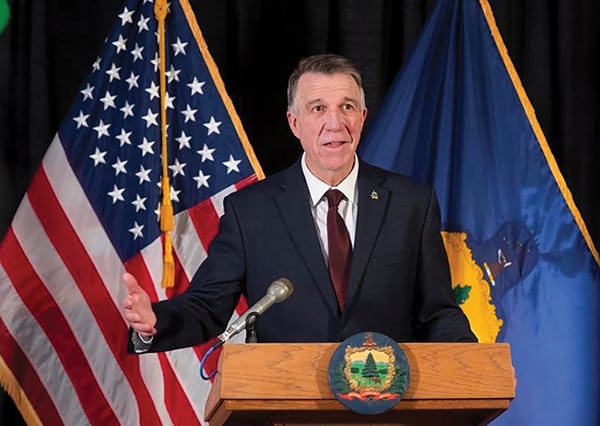By Angelo Lynn
Editor’s note: Angelo Lynn is the editor and publisher of the Addison County Independent, a sister publication to the Mountain Times.
Republican Gov. Phil Scott’s announcement to launch a paid leave program for state employees is a cynical, political move that has sparked deserved criticism. With Democrats pressing for a universal paid family leave policy for the past several years and now holding a veto-proof majority in the Legislature, Scott’s announcement is a political move to suggest he was for paid family leave even though he has blocked it for years.
He will also try to suggest his plan is more “business-friendly” than the universal program Democrats will likely propose, pass and ultimately override a likely Scott veto.
But is Scott’s plan more business friendly?
As it is today, workers must take vacation or personal time off from work to care for a sick child, an ailing parent or grandparent, or bond with a newly born child. Experts who study such issues suggest a reasonable leave policy starts with 12 weeks (many European and other countries offer a year.) Scott’s proposal offers a scant 6 weeks.
Under Scott’s voluntary plan, state employees would be granted benefits (paid with taxpayer dollars), but no one else that first year, starting July 1, 2023. A year later, private companies and other entities with at least two employees will have the option to offer the benefit, but it won’t be required, at a cost estimated at up to $480 per employee for just six weeks of coverage.
A year later, all Vermonters would be allowed into the program, but would have to pay the premium themselves. The staggered start to the program jeopardizes its universal appeal and drives up the cost of the insurance on a per capita basis. That’s bad for workers, and for businesses.
Scott’s scheme particularly poses a significant problem for the state’s smallest businesses: that is, the state’s major economic concern is the lack of labor. Wages are up because demand is through the roof. Because larger businesses can offer higher-cost benefits to attract the workers they need, small businesses will have to match those benefits on the open market, or see workers leave for other jobs.
It’s easy to see who the first beneficiaries will be under Scott’s program. Taxpayer-funded state employees get the benefits a year before all others. College and university employees (if those benefits aren’t already offered) will be next. Schoolteachers, town employees and others will follow, along with larger industries. Smaller businesses that have the cash flow will ante up to keep the valuable employees they have. That leaves the smallest businesses struggling to keep up.
A universal plan, on the other hand, allows the state to drive down per-person costs of the insurance and spread the burden through all employees and employers, as well as allowing a way to subsidize smaller businesses, if necessary.
For small business owners there’s a lot to consider before jumping on a plan that may at first seem business-friendly.




